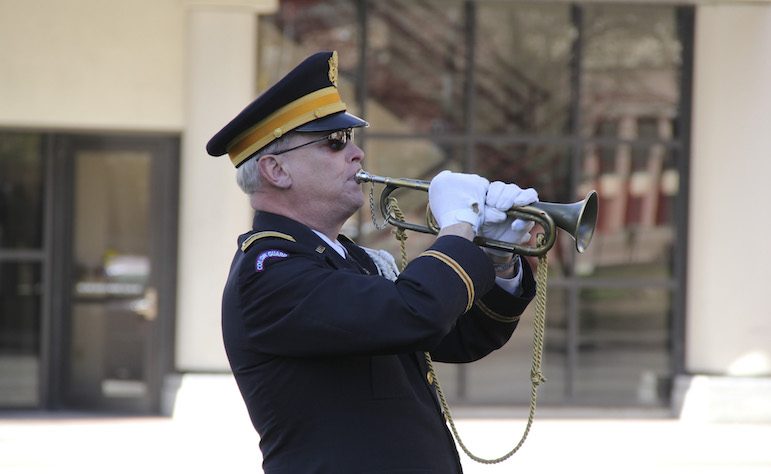Ed Kemmick/Last Best News permalink
Cynthia Myers-Morrison, the granddaughter of World War I veteran Florence Biddles Myers, was holding a photograph of her grandmother.
Last Best News (https://montana-mint.com/lastbestnews/2017/04/never-forget-plaque-honors-women-veterans-of-wwi/)
Cynthia Myers-Morrison, the granddaughter of World War I veteran Florence Biddles Myers, was holding a photograph of her grandmother.
Myers-Morrison was also wearing her grandmother's Army Nurse Corps pin.

At the conclusion of the ceremony, bugler Randy Grow played "Taps."
One hundred years to the day after the United States entered World War I, 23 female veterans of that conflict received a long-overdue salute.
A plaque honoring the women, all of whom were either born or buried in Yellowstone County, or entered federal service here, was dedicated Thursday morning on the lawn of the Yellowstone County Courthouse.
Ed Saunders, an Army veteran from Laurel who spent six years finding the female veterans and chronicling their service, called his quest “an effort to shine the light and show the road back home for them, as they have been largely lost to Montana history.”
He said it was the duty of people all over Montana to “follow our lead and find, validate and honor the military service of Montana’s women veterans of World War I.” Dedicating the plaque, he said, was a way of saying, “Well done, women veterans of World War I from Yellowstone County. You are forgotten no more.”
The dedication was attended by local government officials, representatives of local law enforcement, many veterans, representatives of both of Montana’s U.S. senators and more than 100 onlookers.
Three special guests were members of the Mission Valley Honor Guard—all of them female veterans who are also enrolled members of the Confederated Salish and Kootenai Tribes in northwestern Montana.
Saunders’ researches are not confined to Yellowstone County, and one of his most recent discoveries was the service record of Regina McIntyre Early, an Army nurse who served in four hospitals in France during World War I. Early belonged to the Confederated Salish and Kootenai Tribes, and Saunders thinks she might be the first female veteran of WWI who was an enrolled member of an American Indian tribe in Montana.
Saunders recounted her story and those of several of the women listed on the plaque, noting that while no American servicewomen—almost all of them Army nurses or Navy clerical workers—died from hostile fire during World War I, “hundreds died from disease, accidents of war and utter exhaustion.”He spoke of Harriet O’Day Nielsen, who graduated from high school in Billings and served as an Army nurse in five areas of war-ravaged France. One posting was to Evacuation Hospital 4, near the front lines of the battlefield of Verdun, described by Saunders as a “human cauldron.”
On Nov. 3, 1918, German artillery opened up on the hospital, raining down shells continuously for four hours. Though some of the wounded soldiers died in the attack, Saunders said Nielsen and the other nurses got most of them to safety at considerable risk to themselves.
Nielsen was among the nurses formally recognized by Gen. John Pershing, commander of the American Expeditionary Force, for heroism under fire.
Among those in attendance Thursday were Cynthia Myers-Morrison and Candace Myers, granddaughters of World War I veteran Florence Biddles Myers, and their mother, Norma Myers, who was Biddles Myers’ daughter-in-law.

Ed Kemmick/Last Best News
A plaque memorializing the 23 women with connections to Yellowstone County who served in World War I was dedicated Thursday.
Biddles Myers was a native of England who moved to Canada during the war and then to the United States, where she enlisted in the Army Nurse Corps. She served in a hospital in Langres, France, and then as a Red Cross nurse and a reserve nurse in the Army Nurse Corps from 1920 to 1942.
She and her husband, also a veteran of World War I, lived in Billings for many years before retiring to a farm in Fromberg in 1947. After her husband’s death in 1957, Biddles Myers moved back to Billings, where she died in 1971.
Morrison came in from Chicago for the dedication and her sister and mother came from Albuquerque, N.M. They brought with them a thick scrapbook full of their ancestor’s war records, letters, photographs and other memorabilia, which they put together after her death.
Morrison was wearing her grandmother’s Army Nurse Corps pin, and her sister, Candace, was wearing her bracelet for the ceremony.
The ceremony included the laying of roses on the plaque. The first was laid by Chris Enget, a disabled veteran who served in Afghanistan, the second by Erma Klatt, a real-life Rosie the Riveter who worked in a Portland shipyard during World War II. She was also active for many years in the St. Vincent Healthcare Foster Grandparent Program.
Saunders extended thanks to students at MSUB’s City College, who designed and made the plaque’s metal base, and to the Disabled American Veterans, Billings Chapter 10, which did much to bring about Thursday’s ceremony.
The plaque sat out in the open on Thursday and was to be mounted later on a permanent concrete base on the east side of the courthouse lawn, in the shade of a tall blue spruce tree.